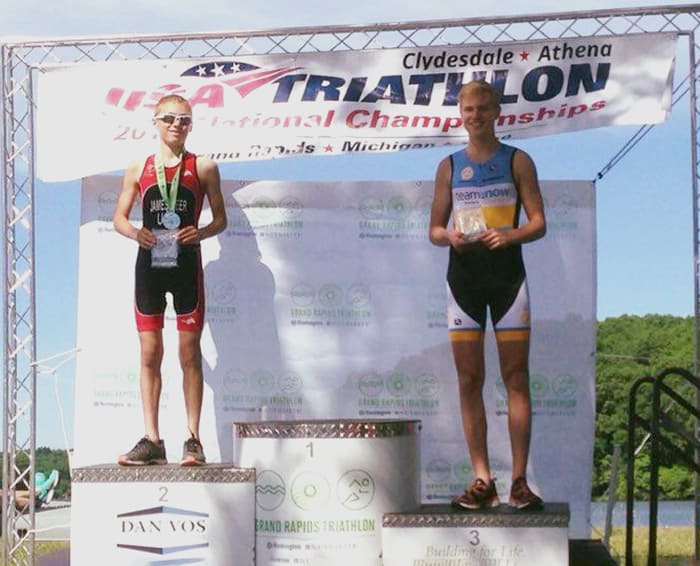
Andrew took second in the 19 and under category of the sprint distance at Grand Rapids Triathlon this year
–By Andrew Fathman, Team OAM NOW Multisport Athlete
I’m a very busy person. I always have been and I don’t see an end to my non-stop lifestyle and mentality. Typically this is a good thing because I’m able to efficiently get a lot of stuff done like school, training, and taking time to hang out with friends. This is also a great quality to have in the workplace. However, when you go from incorporating your training into your daily routine, to having to work 60+ hours a week and having to force your training in, it can be hard to stay on top of things. Ever since I started my summer jobs in early May, training has had to take a backseat. While it usually is the pinnacle of my day’s productivity, it is now scraping the bottom of the barrel for whatever minutes I can fit in. Since this is one of the most important race seasons of the year, I knew that I would have to compensate somehow. My epiphany was taking my efficiency to a whole new level.
I try to stay up-to-date on the latest training strategies and techniques, so in the past, I’ve usually just relied on my own brain to come up with a training schedule. However, being conditioned for the “slow and steady” approach to training through high school seasons and the seemingly endless River Bank training, I was not prepared for the high-effort, low-hour training summer requires.
After some research, I realized that my mind cannot come up with the appropriate training schedule week-to-week that would work every area of a race (speed, endurance, finishing, pacing, etc.) in all three disciplines, so I opted to go with a training plan to keep me in check. After some deliberation, I choose Garmin’s level II sprint tri schedule to lead me to great times. And the verdict? It works like a charm. I have never felt like my training is so pointed and specific that I can actually feel the specific section of the race that I’m working on get faster. This training plan takes full advantage of rest days, while also conditioning your mind and body to the rigors that the sport demands. Perhaps the biggest benefit is that the mental strain of finding ways to make myself hurt has been lifted.
Most of my workouts tend to be between the 35-60 minute range, with longer workouts on the weekend, so it fits perfectly into my lunch period. While before I would go out and fill 45 minutes with a run/bike/swim all willy-nilly, now I fill that same amount of time with productive, focused work. I’m now doing more productive work in the same or less amount of time, just by trusting that the training knows what it’s doing. And it does. You don’t need 10-12+ hours a week to get your training done, you just have to employ the luxury of efficiency to get you to where you need to go. I’ve been training fewer hours with more high quality workouts than I ever have before, and this past weekend, I posted my best Grand Rapids Tri time yet.
The post The Power of Focused Training appeared first on Team Athletic Mentors.
 Athletic Mentors
Athletic Mentors